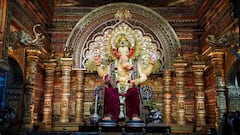Kharmas 2024: Why Did Bhishma Wait For Kharmas To End Before Leaving His Mortal Body? Know Here
Auspicious tasks performed during Kharmas are believed to be unsuccessful. Know here, why Bhishma waited for Kharmas to end before leaving his mortal body.

Kharmas 2024: According to Hindu astrology, no auspicious work is performed during Kharmas, a period when the Sun transits through Jupiter’s zodiac signs of Sagittarius (Dhanu) and Pisces (Meen). During this time, the Sun’s energy diminishes, leading to a reduction in its positive influence as the celestial body representing vitality, energy, and strength weakens.
It is also believed that a person’s death during Kharmas is inauspicious. In the Mahabharata, Bhishma Pitamah, blessed with the boon of voluntary death (Ichhamrityu), refrained from relinquishing his life during this period despite enduring 58 days of excruciating pain on a bed of arrows.
Let’s understand the significance behind why Bhishma waited for Kharmas to end before surrendering his life force.
ALSO READ: Somvati Amavasya 2024: Know What Happens By Lighting A Lamp On Somvati Amavasya
The Mythological Significance Of Bhishma’s Decision:
At the time of the Kurukshetra War, Bhishma Pitamah was invincible, instilling fear among the Pandavas with his unparalleled strength. Only Lord Krishna knew the secret to Bhishma’s demise and devised a plan to bring him down using Shikhandi. Bhishma had vowed to fight only men, and Shikhandi, embodying both male and female elements, became the key to his downfall.
On the 10th day of the war, Arjuna and Shikhandi attacked Bhishma together, wounding him severely and leaving him lying on a bed of arrows. Despite being blessed with the power of Ichhamrityu, Bhishma chose to endure the agony for 58 days, waiting for Kharmas to conclude before embracing death.
Why Death During Kharmas Is Considered Inauspicious
During Kharmas, the Sun moves southward, marking the Dakshinayan period. According to religious beliefs, those who die during Dakshinayan are said to face the consequences of their actions in hell. Understanding this, Bhishma Pitamah, even in unbearable pain, waited for Kharmas to end and for the Sun to move toward Uttarayan (northward motion), which is considered an auspicious time for liberation.
This enduring patience highlights Bhishma’s commitment to righteousness and his respect for celestial laws, leaving a profound lesson in faith, perseverance, and the significance of auspicious timing in Hindu mythology.
[Disclaimer: The content of this article is based solely on beliefs, and should be taken as general guidance. Individual experiences may vary. ABPLive.com does not assert the accuracy or validity of any claims or information presented. It is strongly recommended to consult a qualified expert before considering or implementing any information or belief discussed herein.]
Related Video
Magh Mela: Triveni Sangam Witnesses Sea of Faith on First Snan of Magh Mela






































